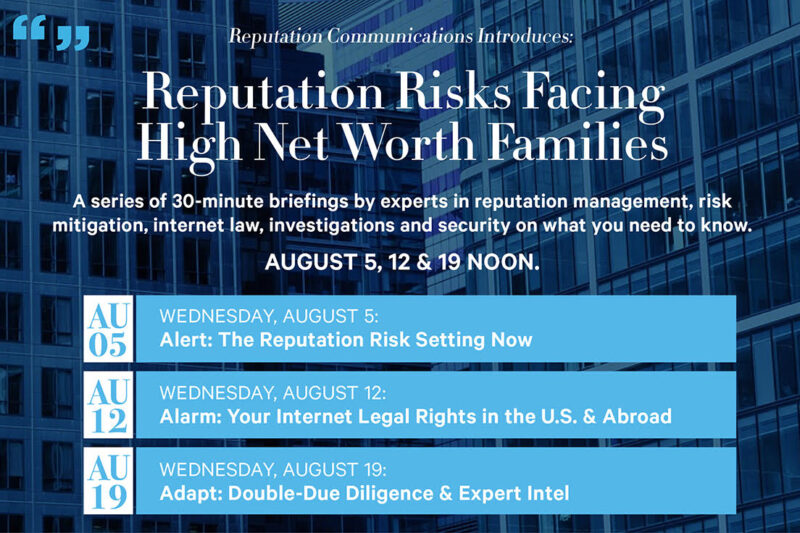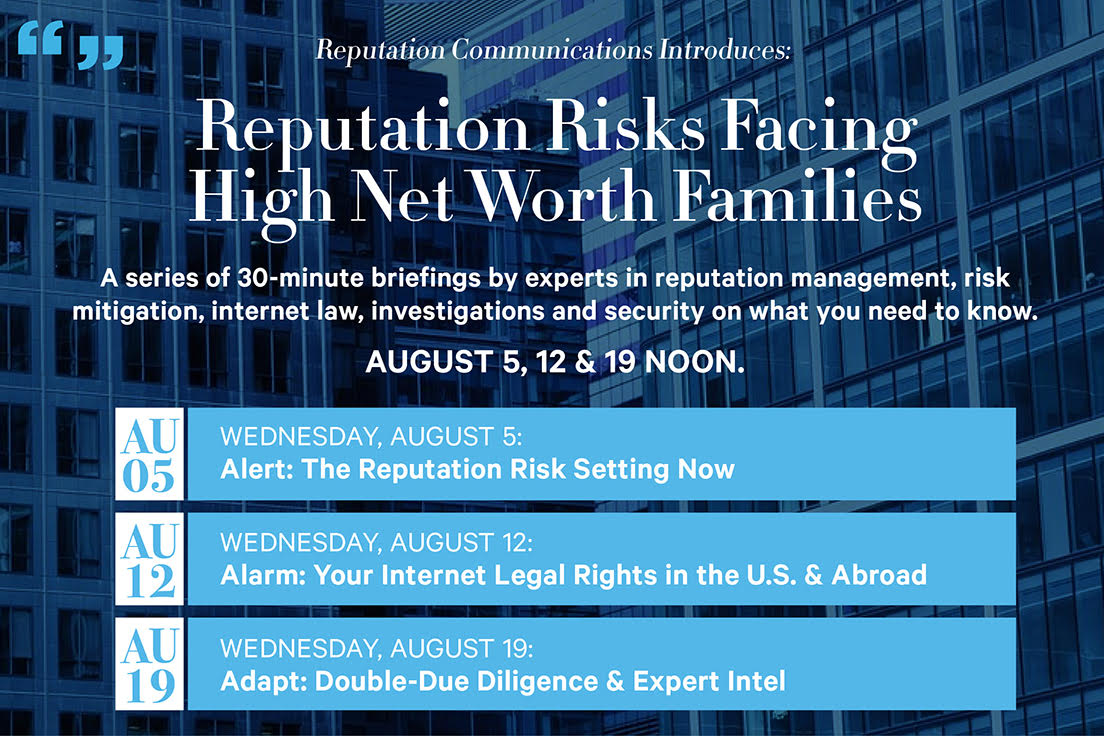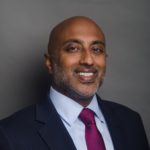

3-Part Briefing, August 5, 12 & 19, 2020
A three-part series of live, 30-minute briefings with reputation management, Internet law, investigations, due diligence and risk mitigation experts will take place on August 5, 12 and 19, 2020. Registration is free and may be made via the links below. The program will be held on Zoom.
Focusing on reputation risk facing high-net-worth families (HNWFs), the program is hosted by Reputation Communications and moderated by its founder and CEO, Shannon Wilkinson.
Participants include Don Aviv, President of Interfor International; Tim Murphy, President & CEO of Consortium Networks; David Niccolini, Co-Founder of TorchStone Global; Christine Rafin, Associate General Counsel – Media and Compliance at American Media in New York City; Dan Shefet, Individual Specialist to UNESCO, and Adviser to the Council of Europe on the Internet Ombudsman; and an expert in Internet law; and Arun Rao, President of IGI.
“In a digital world, everyone faces reputation risk,” says Shannon Wilkinson. “But high-net-worth families and individuals face special scrutiny and a dangerous loss of privacy both online and off. Online personal and reputational attacks, threats and disparagement, unfounded allegations, disinformation campaigns, impersonation schemes, disturbing online threats, extortion, and harassment are some examples. These risks can impact all areas of their professional and personal life. Having served victims of such issues for a decade, I want to provide HNWFs with my own insight, as well as credible information from colleagues who are experienced in helping such families.”
Program details follow.
Wednesday, August 5: Alert: The Reputation Risk Setting Now.
Shannon Wilkinson will introduce the program and summarize the types of reputation risks HNWFs face, including generational ones, from family leaders to teens and college students.
David Niccolini will provide an overview of the current environment contributing to the aforementioned threats, examples of the types of risks HNWFs encounter now, and the importance of situational awareness.
Tim Murphy will introduce cybersecurity threats that are increasingly common and unique to HNWFs, including account takeover and ransomware attacks.
Click here to register for the August 5th briefing.
Wednesday, August 12: Alarm: Your Internet Legal Rights in the U.S. & Abroad.
Shannon Wilkinson will introduce the program and highlight the differences between American Internet and privacy laws and those in Europe and other countries.
Christine Rafin will summarize why consumers have so few Internet legal rights in the U.S., and address common questions relating to the removal of negative, defamatory and/or infringing material from the Internet.
Dan Shefet will explain how the “Right to Be Forgotten” law operates in Europe and Argentina; provide examples of the types of content that is removable on Google; and describe the privacy laws in Europe, which are far stronger than in the U.S. He will briefly address similar online privacy laws in other countries.
Click here to register for the August 12 briefing.
Wednesday, August 19: Adapt: Double-Due Diligence & Expert Intel.
Shannon Wilkinson will introduce the program and why the issues of due diligence and investigations are relevant in high-net-worth reputation risk cases.
Don Aviv will provide inside examples of the types of threats that due diligence has revealed, especially on the personal rather than organizational side of HNWFs.
Arun Rao will share insight into the types of reputation risk issues facing prominent public figures like elected officials, candidates for public office, entertainers, and high-profile executives. Key issues include investigating and addressing false allegations and “fake news.”
Click here to register for the August 19 briefing.
About the Speakers
Don Aviv: As president of Interfor International, Don has managed, led, and coordinated teams on thousands of due diligence and investigative cases, many with complex aspects and multinational reaches. He directly supports chief security officers and general counsel of some of the world’s leading corporations, financial institutions, and family offices.
Tim Murphy: Tim is a recognized leader in global cybersecurity and intelligence. In his previous role as Deputy Director of the FBI, and now as CEO of Consortium Networks, a cyber network and solutions firm, his experience covers all operational aspects of counterintelligence, criminal, cyber, and intelligence programs. He has experience in ensuring the technological and cybersecurity of companies, high-net-worth individuals and their family offices.
David Niccolini: David Niccolini co-founded TorchStone in 2010. The company has won numerous awards and has been featured in Forbes, The Wall Street Journal, CNN, the Washingtonian, and the PBS News Hour. Over the years, David has directed security, consulting, and investigative operations across six continents on behalf of families (to include Forbes 400) and multinational corporations (to include Fortune 50).
Christine Rafin: As Associate General Counsel – Media and Compliance at American Media, LLC, Christine advises on defamation, privacy, intellectual property and publicity issues for a wide range of brands, including podcasts, online publications and magazines from National Enquirer to US Weekly. Christine has extensive experience representing high net worth individuals in federal and state civil, commercial and regulatory matters. She is an expert in the rapidly-evolving fields of Internet law, digital marketing law, and data privacy and security law.
Arun Rao: As the President of IGI, Arun draws on his experience at the Department of Justice, the White House, and the New York County District Attorney’s Office to advise clients on crisis and risk management. Arun and his team provide concierge-level assistance to elected officials, candidates for office, entertainers, and other prominent individuals facing reputational attacks, threats, and disparagement. As Principal of The Lenzner Firm (IGI’s affiliated law firm), Arun also provides counsel on potential legal remedies.
Dan Shefet: A French lawyer based in Paris, Dan Shefet holds a Philosophy Degree and a Law Degree from the University of Copenhagen. Specializing in European Law, Competition Law as well as Human Rights in general and in the IT environment in particular, he is a noted public speaker on IT Law, Data Privacy and Human Rights on the internet. In 2014 he founded the Association for Accountability and Internet Democracy (AAID) the main objective of which is to introduce a general principle of accountability on the internet.
Shannon Wilkinson: As the founder of Reputation Communications, one of the first firms in the online reputation management space, Shannon has advised numerous high-net-worth clients, including CEOs, business leaders, luxury brands, public figures, philanthropists, Forbes 400 and Forbes 500 clients, entertainment industry icons, FinTech leaders, tech founders, venture capitalists, and others. Reputation Communications is based in New York.



